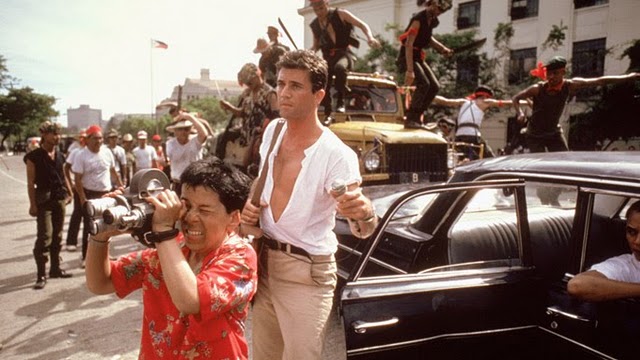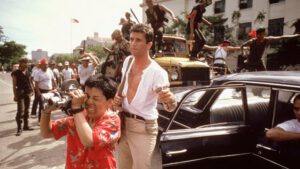Movie Info
Movie Info
- Director
- Peter Weir
- Run Time
- 1 hour and 44 minutes
- Rating
- PG
VP Content Ratings
- Violence
- 4/10
- Language
- 3/10
- Sex & Nudity
- 3/10
- Star Rating
Relevant Quotes
"What then shall we do?"
"And at his gate lay a poor man named Lazarus..."
1969 was the year in question, the last year of the despotic reign of Indonesia’s President Sukarno. Guy Hamilton (Mel Gibson) meets in Jakarta the diminutive Billy Kwan (Linda Hunt). The first is an Australian radio reporter on his maiden overseas assignment. A crack photographer who had worked with Guy’s predecessor, Eurasian Billy Kwan takes Guy under his wing and introduces him to the culture and leading figures of the city.
More importantly, Billy Kwan helps Guy overcome his indifference to the poor of the city’s slums. When they first meet and Billy walks with Guy through a market where peasants sell cheap goods, Billy quotes the above passage from Luke as he tries to interest the journalist in the plight of the poor—Billy himself we learn later has been supporting a peasant woman and her sick child—but at that time Guy is too absorbed in advancing his career to take on any other concern.
Billy sees something in Guy that he thinks will make him a more humane man, and so he becomes his photographer and guide to the city. Bill has developed contacts inside the government, and more important as far as Guy is concerned, in the underground Communist Party as well. Thanks to Billy the new kid on the block scores a number of exclusive interviews, making him the envy of the other journalist who gather at their favorite bar.
Over the next few weeks he brings out a passion in Guy for changing the conditions for the downtrodden peasants. And he introduces Guy to Jill Bryant, an attaché at the British Embassy. As rumors of an impending coup by the Communists circulate, Guy so single-mindedly searches for the story that he loses his sense of perspective. Billy, serving as a gadfly to the cynical Western correspondents who were indifferent to the poor outside their doors, feels betrayed by Guy. Disillusioned by President Sukarno, whom Billy had thought actually cared for the people, the little photographer sets into motion a series of events that lead to both crucifixion and regeneration. Ironically, as he opens the eyes of Guy to moral and spiritual values, Guy is struck by a soldier during a demonstration and suffers a brief period of blindness. (Thus his life bears some resemblance to that of Saul who became Paul of Tarsus.)
This Peter Weir directed film is a marvelous story of the clash of cultures and values, and of the cost of caring. It is unfortunate that it was marketed as a screen romance, and still is regarded by many as such. Note that in the poster Linda Hunt’s image, who won an Oscar for playing Billy Kwan, is much smaller than that of Sigourney Weaver’s. The film’s social justice theme and the ethical transformation of its central character are all too often overlooked. But not by those of you who follow Visual Parables!
For thought and discussion
- In a film of many powerful scenes which one made a deep impression upon you?
- Describe Guy Hamilton as you first encounter him. What motivates him? How aware is he of the people around him? What is his reply to Billy when the latter suggests that five dollars from him could change the life of one of the people in the market? What do you learn of the nature of Guy’s character in the following scenes?
When Guy meets Jill and the Major;
When Pete “buys” the dwarf for Guy in the bar;
When Pete talks Guy into driving up to the cemetery where the prostitutes meet their customers?
- Describe Billy Kwan as you first see him. Does he seem sinister or mysterious? What do you think of his conversation with Guy as they walk through the market at night? Of how he deals with the overwhelming problem of Asian poverty? “Well, I support the view that you just don’t think about the major issues. You do whatever you can about the misery that’s in front of you. Add your light to the sum of the light.” What is Guy’s response to this? Sound familiar? Any similar scenes in our country?
- Describe the following characters as to their motivations and values: Jill Bryan; Kumar; Pete Curtis; Wally O’Sullivan
- When they form their partnership, Billy tells Guy, “I can be your eyes.” Do you see any meaning here beneath the surface of the words? How does this happen in ways that Guy does not dream of at this point? How is Billy’s profession important here? But does he maintain that detachment from his subject that marks most professionals?
- In the bar Pete tells the others how cheaply prostitutes can be obtained at the cemetery. What is Billy’s response? How is Billy following in the prophetic tradition here? What other incidents in the film indicate this? Note Pete’s response: “Keep it up, Billy. Keep it up. We’ll nail you to the old cross…!” What kind of a figure is Billy? Compare him to other Christ figures in such films as Cool Hand Luke; Babette’s Feast.
- What do we learn of Billy when Guy looks over his photographs? Who is Billy’s idol? How is this dangerous?
- What is the significance of Billy’s exposition on the shadow puppets? Of what are his religious and social beliefs a blend? How do you understand his response to Guy’s question about the dwarf puppet, “He serves the Prince”?
- What has Billy been doing that shows he follows the philosophy of his first conversation with Guy: “You do whatever you can about the misery that’s in front of you”? During his anxious musings about the woman and her sick child what is it that Billy quotes? And what of his response? (“We must give our love to whomever God has placed in our path.”)
- What is it that drags Guy, now so concerned with the poor, back to his former self? How does Billy see this? Do you agree with Billy’s comments that he puts in the form of questions: “You have changed. You are capable of betrayal…Why can’t you give yourself? Why can’t you learn to love?”
- As Guy travels with Kumar in his search for more information on the PKI and their incoming arms shipment, he has a dream after they stop in the country. What is the significance of the dream? What revelation does it bring? Comment on their conversation: Kumar: “My country suffers under poverty. Is it wrong to want to change that?” Guy: “Are you going to by killing?” Kumar: “Sometimes it is necessary…”
- What happens to change Billy’s view of Sukarno? How do the next few scenes show the anguish of spirit he is suffering? How does he take out his grief and anger on the reporters? Do they deserve his comments? In his confrontation with Guy Billy says: “I thought you were a man of light. I made you see things…I gave you my trust…I created you!” In what sense is Billy right about his last comment? How are we all a “creation” of other people? Who has helped in the creation of yourself as you are today?
- When Billy checks into the hotel do you have a sense of what is going to happen? Why does he do what he does? Does it do any good? (And is this the chief criterion for judging a person’s act?)
- How does Billy’s death bring redemption to Guy? How is his temporary blindness fitting? What symbolic act shows that Guy has turned his back on his old values and ways?


